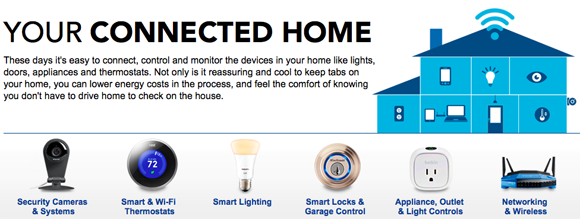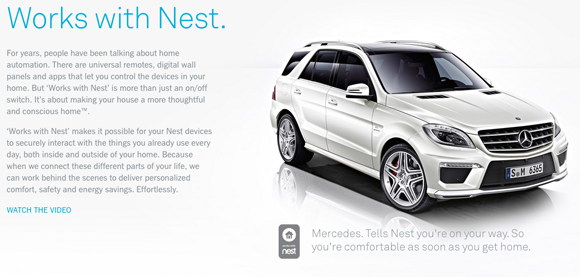There's already a plethora of connected home devices on the market. Smart light bulbs, door locks, power outlets, and thermostats can all be found on Target, Lowes, Home Depot, and Staples' shelves. But this holiday season Best Buy's (BBY 0.08%) launching dedicated connected home departments in 400 of its retail stores, effectively ramping up consumers' exposure to smart home products.
With retailers making a big push, Google's (GOOG 0.02%) (GOOGL 0.05%) Nest Labs and Apple's (AAPL +0.47%) HomeKit platform are likely the eventual big winners from this connected home space. But Apple hasn't officially launched its HomeKit integration yet, leaving Google and other competitors with a head start.

Source: Best Buy.
The connected home for the common man
Though smart home kits, devices, and services have been on the market for years, Best Buy's big push could signal a new focus on smart home technology.
The retailer is adding Peq, Honeywell, Dropcam and Nest devices into its new connected home departments, and will specially train salespeople in 200 of its stores on the products and their uses.
It's no coincidence Best Buy is making such a big deal about connected homes after Apple announced HomeKit back in June and smaller companies are building a plethora of connected home devices. But as Best Buy introduces potential customers to new smart home technologies, Apple's HomeKit will have to sit this holiday season out.

Source: Apple.
Waiting in the wings
Apple's HomeKit will pair the iPhone and iPad to connected devices around the home, letting users tell Siri to turn the lights off or turn the thermostat down. At the core of HomeKit will likely by Apple TV, acting as a hub that light switches, garage doors and other smart home devices connect to.
But Apple TV was left out of any major product updates this fall, and it's likely the device won't receive a new upgrade until early 2015. While beta versions of Apple TV software show support for HomeKit, the other factor holding back Apple's connected home platform is the company's certification process.
Devices with HomeKit certification are still being built by third-party companies like Honeywell, Phillips, and others, and will come to market sometime in 2015. While many of these products may work with the iPhone right now through existing apps, Apple has to officially certify devices to work on the HomeKit platform, and that takes time.
Why showing up late won't matter
Apple's reason for getting into the connected home space is to ultimately sell more Apple TVs, iPhones, and iPads. The company isn't making smart door locks or light switches, but is rather focusing its attention on controlling those things with its products.
And this is one of the main reasons why it doesn't matter that Apple will miss this year's holiday season push for connected homes. Most of the connected home devices on the market already pair with the iPhone or iPad, which makes Apple's devices a valuable asset in the connected home already -- even before HomeKit's launch.
But that doesn't mean Apple doesn't have serious competition in the space.
Apple doesn't own the connected home
If there's any clear leader in the connected home space right now, it may be Nest Labs, which Google purchased for $3.2 billion earlier this year. Aside from the company's smart thermostat -- which has become a kind of icon of the connected home -- Nest launched a developer program called 'Works with Nest' this year that allows third-party devices to work with Nest products.

Source: Nest Labs.
This is a way for Nest to become the hub of the connected home, in a similar way that Apple aims to be with HomeKit. Mercedes-Benz recently released a Works with Nest application for some of its vehicles which pairs with the Nest thermostat to automatically adjust the temperature the closer the driver gets to their home.
Foolish thoughts
For both Apple and Google, the idea of owning the platform that controls the connected home is the main goal. Google's Nest is already firmly moving in that direction and Apple is following closely behind. So while this holiday season may bring a spike in consumers' awareness of connected home capabilities, the real competition should begin once Apple enters the space early next year.
Apple clearly doesn't need HomeKit to successfully sell its products. The company reported its latest quarterly earnings this week, and sold a stunnning 39.2 million iPhones over the past three months. But building products and platforms for the connected home is the next big opportunity for tech companies, and Apple clearly wants to influence the space -- it'll just have to do it a bit later than the competition.














